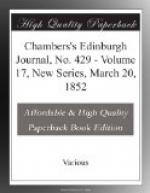“Well, what’s the matter? I understand you can’t make your cash quite right.”
“No, sir.”
“How much are you short?”
“Eight pounds, sir.”
“Never mind; I am quite sure you have done what is right and honourable. It is some mistake; and you won’t let it happen again. Take this and make your account straight.”
’The young man takes the proffered paper. He sees an order for ten pounds; and retires as full of admiration as he had approached full of anxiety.
“Now, what is the next thing?” This time a porter is summoned. He comes forward as if he expected rebuke. “Oh! I have got such a complaint reported against you. You know that will never do. You must not let that occur again.”
’Thus, with incredible dispatch, matter after matter is settled, and all who leave that office go to their work as if some one had oiled all their joints.
’At another time, you find the master passing through the warehouse. Here, his quick glance descries a man who is moving drowsily, and he says a sharp word that makes him, in a moment, nimble. There, he sees another blundering at his work. He had no idea that the master’s eye was upon him, till he finds himself suddenly supplanted at the job. In a trice, it is done; and his master leaves him to digest the stimulant. Now, a man comes up to tell him of some plan he has in his mind, for improving something in his own department of the business. “Yes, thank you, that’s a good idea;” and putting half-a-crown into his hand, he passes on. In another place he finds a man idling. You can soon see, that of all spectacles this is the one least to his mind. “If you waste five minutes, that is not much; but probably if you waste five minutes yourself, you lead some one else to waste five minutes, and that makes ten. If a third follow your example, that makes a quarter of an hour. Now, there are about a hundred and eighty of us here; and if every one wasted five minutes in a day, what would it come to? Let me see. Why, it would be fifteen hours; and fifteen hours a day would be ninety hours—about eight days, working-time, in a week; and in a year, would be four hundred days. Do you think we could ever stand waste like that?” The poor loiterer is utterly confounded. He had no idea of eating up fifteen hours, much less four hundred days, of his good employer’s time; and he never saw before how fast five minutes could be multiplied.’
Mr Budgett was the son of a worthy couple, not exactly in poor, but in rather difficult circumstances. He had little school education; but his mother gave him a good religious training. From his earliest intelligent years, he loved traffic. His first transaction was getting a penny for a horse-shoe which he had found. Discovering that for a half-penny he got six marbles, but for a penny fourteen, he bought pennyworths and sold them in half-pennyworths to his companions, thus realising a profit. Meeting




